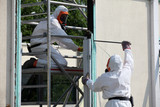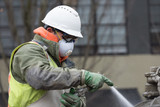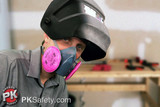Blog
Respirator Ratings: What Do N95 and P100 Respirator Ratings Mean?
If you and your team need to wear respirators on the job, it helps to have a means of comparing the relative protection between different respirators and filters. These ratings are designed to help protect you and your workers from different sets of airborne hazards. Sawdust and particles containing asbestos fibers are not the same. Neither should we use the same filter. If you use the wrong type of mask on the job, it could put you and your team at risk.
Learn more about N-, R-,
…
Mar 2nd 2020
Respiratory Basics: P100 vs N95
For a lot of job sites, safety masks and respirators are an essential piece of PPE. The lungs are delicate, important organs that are hard to repair if they get damaged, and inhaling the wrong chemical can have devastating effects on other areas of the body as well. Protect yourself from invisible airborne particles by investing in a respirator or mask suited to your job.
How Masks and Respirators Are Rated
The National Institute for Occupational Safety and Health (NIOSH) is a divisio
…
Feb 4th 2020
How Often Should You Replace Your Dust Mask?
First of all, a dust mask is has a single strap that goes over the head and provides very little protection from particles and debris in the air. They're also called
nuisance dust masks and they're best used for mild applications like leaf blowing and general household dust protection. Dust masks just don't provide a good face seal and they protect about as well as nose hair, which is to say not that well. Replace them when they look dirty or after about 8 hours of wear. Honestly they're n
…
Nov 20th 2013
Welding Respirator: How Can You Protect Yourself From Welding Fumes?
Welders understand that the fumes and gases produced from their work can lead to serious illness. The danger and amount of exposure to the welders depend on the type of work being done, the rod, filler metals, base metals, coatings, contaminants, as well as the amount of ventilation and respiration protection.
We simply don't know everything there is to know about protecting workers from welding fumes. However, there are some common precautions that can be taken to protect workers from
…
Sep 12th 2012
Respirator Filters: How Long Will They Last?
Last week a customer sent us a question asking how long the 3M 2097 Particulate Mold Filters last. The answer is - it depends. Since it's a fairly common question, and "it depends" is such an unsatisfactory answer, we thought we'd explain it here in a bit more detail.
The useful life of filters and cartridges is not fixed. In the case of the
3M 2097 P100 (HEPA) filters, we have two elements to consider: the filter and the charcoal layer.
The P100 HEPA (which stands for High-Efficiency
…
May 2nd 2012
Mold Respirator: Respiratory Mask for Mold and Protection from Mold Spores
A common inquiry from customers concerns protection from mold exposure, particularly when trying to clean up or get rid of mold. Our focus will be on choosing respirator and filters.
First, we should probably say that there are a couple of considerations. Some people are simply more sensitive to mold than others and even small exposures will make them ill. Second, not all mold is created equal. Some forms, Stachybotrys chartarum (often referred to as black mold) can have severe health c
…
Oct 10th 2011
Lead Fume Respirator: Respirator Protection from Lead and Paint Fumes
The variety of jobs and tasks our customers set out to do continually amazes me. Here is a query from a recent customer about his task:
In an upcoming job I will be melting lead and spraying acrylic and lacquer based paints. What mask and filters do you recommend to protect me from the fumes associated with these tasks? How does sizing on the masks work?
For the lead fumes I suggest using a P100 (HEPA) filter such as the
3M 2091 Particulate Filter or the 3M 7093 P100 HEPA filte
…
Jun 10th 2011








